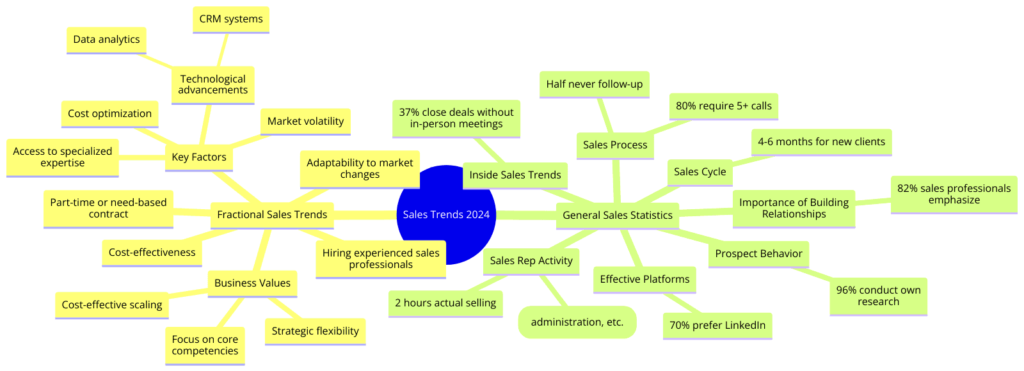The Strategic Shift Reshaping Business Leadership
In today’s fast-paced business world, staying ahead of the curve is essential, but not every company has the resources to hire full-time executives. That’s where fractional executives come in, experienced leaders who guide your business on a part-time or project basis without long-term commitment.
If you’re a business owner grappling with strategic decisions and limited budgets, fractional executives could be your key to unlocking potential and driving growth.
Key Statistics and Insights about Fractional Sales and General Sales Trends In 2024

2024 is turning up the volume on this trend, buzzing with opportunities for businesses to tap into top-tier talent affordably. Our landscape is shifting rapidly; hiring a seasoned CFO or CMO just for the time you need them isn’t just smart—it’s strategic.
Whether your company needs guidance through a merger or expertise in setting up new tech systems, these flexible leaders are making waves across industries by offering their wealth of knowledge whenever needed.
Dive into our deep-dive analysis as we unpack 2024’s hottest trends in fractional leadership! We’ll explore how calling upon this gig economy marvel can revolutionize your approach to executive management while keeping costs down.
Ready for insights that could redefine how you do business? Let’s get started, growth awaits!
Key Takeaways
| Key Aspects | Details |
|---|---|
| Role of Fractional Executives | Part-time leaders who provide growth support without the full-time executive cost. They bring extensive experience and are swiftly available for specific projects or transitional phases. |
| Data-Driven Decision Making | In 2024, businesses increasingly rely on data for strategic decisions. Fractional leaders like CFOs and CTOs employ data analytics to identify trends and address issues efficiently. |
| Rise of Remote Work | Fractional executives effectively manage teams remotely, utilizing tools like video conferencing and project management software to maintain connectivity and operational momentum. |
| Embracing Automation | Automation is crucial for fractional executives, enabling them to manage tasks more effectively and concentrate on strategic planning. This technology aids in efficiently serving multiple clients. |
| Emotional Intelligence | These leaders possess strong emotional intelligence, essential for quickly adapting to various company cultures and building effective relationships in short timeframes. |
Understanding Fractional Executives

Diving into the realm of fractional executives reveals a transformative approach to leadership; it’s an innovative solution that infuses businesses with top-tier expertise without full-time commitment.
This strategic choice opens doors to growth and adaptability, reshaping how companies leverage executive talent in a fast-paced market.
Definition
A fractional executive is a seasoned leader who joins a company on a part-time basis. They bring their expertise to guide business strategy and provide executive leadership without the full-time commitment or cost.
This role is perfect for organizations that need strategic direction but aren’t ready for a full-time hire. Think of it as having access to a top-notch CFO, CMO, or CHRO without employing them five days a week.
These experienced pros dive into your team, offering insights and leading projects in areas like digital marketing, healthcare industry innovations, and supply chain management. They understand company culture and tailor their approach to fit yours.
By leveraging their know-how on an as-needed basis, businesses can scale effectively while staying lean with their budgets.
Benefits
Fractional executives bring new energy and insights to businesses. They offer a range of advantages that can help your company grow.
| Benefit | Summary Explanation |
|---|---|
| Cost Savings | Fractional executives enable cost efficiency by negating the need for full-time executive salaries and benefits. This financial flexibility is particularly beneficial for SMEs that require expert guidance without the associated high costs. |
| Diverse Industry Experience | With experience across multiple industries, fractional executives bring a broad spectrum of successful strategies and insights. This diversity allows them to provide innovative solutions and unique perspectives tailored to specific business challenges, enhancing the company’s strategic approach. |
| Flexibility in Hiring | The hiring process for fractional executives is faster and less binding than for full-time positions. Their roles can be easily modified or concluded as business needs evolve, offering companies significant agility in management resources. |
| Quick Problem-Solving | Fractional executives possess the ability to rapidly identify and solve problems, thanks to their extensive experience and external perspective. They can often foresee and mitigate issues before they escalate, ensuring smoother business operations. |
| Innovative Perspectives | Unburdened by internal politics or traditional mindsets, fractional executives often introduce fresh, innovative ideas and approaches. This can lead to significant advancements in business strategies and operational processes. |
| Access to Top Talent | Fractional roles make top-tier executive expertise more accessible to a wider range of businesses. They offer a cost-effective solution for companies to leverage high-caliber talent that might otherwise be unaffordable or hard to attract on a full-time basis. |
| Promoting Workplace Flexibility | Fractional executives often advocate for and demonstrate flexible work practices, fostering a resilient and adaptable company culture. This adaptability is crucial in rapidly evolving market conditions and can contribute to a more dynamic business environment. |
| Strategic Planning Skills | These executives focus on aligning all business activities with the company’s overarching goals. Their strategic planning ensures efficient and effective resource utilization, driving growth and long-term success. |
| Results-Driven Approach | Focused on measurable outcomes, fractional executives emphasize delivering tangible benefits and results for the business. This goal-oriented approach ensures efforts are concentrated on achieving specific, impactful objectives. |
| Entrepreneurial Energy | The dynamic and entrepreneurial spirit of fractional executives can inspire and motivate the entire workforce, fostering a proactive and innovative work environment. This energy can invigorate teams and projects, leading to enhanced creativity and productivity. |
| Supply Chain Expertise | In industries where supply chain management is critical, fractional executives offer specialized knowledge and strategies for optimizing complex systems, particularly in a global context. This expertise can significantly enhance a company’s ability to navigate and manage supply chain challenges effectively. |
| Improved Project Management | By introducing advanced tools and methodologies, fractional executives can streamline operations and improve overall project management. This leads to better efficiency, clearer communication, and more effective business processes. |
Success Stories
Companies are seeing big wins with fractional leaders. One tech startup tripled its sales after hiring a fractional chief marketing officer. The new CMO revamped the entire marketing strategy and launched successful campaigns across social media platforms.
Another company, a retail business struggling with high employee turnover, brought in a fractional chief human resources officer. This move led to improved organizational culture and better employee engagement.
In the world of health technologies, a venture capital-funded firm was facing roadblocks in product development. They decided to hire a part-time chief technology officer who brought in fresh perspectives and technological advancements.
Within months, the project was back on track, showcasing how access to experienced leadership can make all the difference for growth-focused businesses.
The Rise of Fractional Executives

Many business landscapes in 2024 are changing, and fractional executives are leading the charge. These leaders offer a wealth of expertise without full-time commitments, making them perfect for modern businesses that need to pivot quickly.
Start-ups and established companies alike see the value in hiring experienced minds for short-term projects or part-time guidance.
Fractional work is on an upward trend, with CEOs from various industries planning to increase their use of expert executives on a part-time basis. The gig economy is booming, and top positions like chief financial officers and chief technology officers are being filled fractionally.
Businesses get high-level skills at lower costs while these professionals enjoy more freedom and variety in their work. It’s a win-win situation—companies stay nimble with seasoned leadership; fractional execs thrive on new challenges across different business models.
The Impact of Fractional Leadership on Business Growth

Discover how the dynamic fusion of top-tier talent and strategic flexibility inherent in fractional leadership is reshaping growth trajectories for businesses looking to thrive in an ever-evolving marketplace—keep reading to unlock these transformative insights.
Flexibility and Cost Savings
Hiring a fractional executive means you only pay for the time and skills your business needs. Think of it like having an on-demand chief operations officer or chief financial officer without full-time salaries or benefits.
It’s a cost-effective option, especially if budgets are tight or you’re navigating uncertain markets. This flexibility also allows you to respond quickly to changes in the business world.
Businesses can save money on office space too. Fractional execs often work remotely, cutting down on the need for large offices. Whether it’s project management during mergers and acquisitions or crafting marketing campaigns, these leaders bring know-how as needed.
They help companies adapt fast while keeping costs low, essential for growth in 2024’s competitive landscape.
Access to Expertise
Businesses often hit a wall—they need expert help but can’t afford a full-time executive. Fractional executives are the perfect solution to this problem. They bring years of know-how and best practices from their fields.
Imagine having top-level talent like CFOs and CTOs, just when you need them. This setup is like tapping into a gold mine of strategies for growth and success.
Employers get to pick from a vast pool of experienced pros without the long-term cost. It’s no wonder 72% of CEOs are planning to hire more fractional experts in 2024! You gain access to specialized skills that can navigate market changes and compliance issues with ease.
Plus, these seasoned leaders come ready to tackle unique challenges your business faces—without any handholding.
Scalability
A business can grow fast with fractional executives. They join teams to tackle big projects without the long-term cost of a full-time hire. This way, your company stays lean but gets expert skills just when needed.
Imagine having a top-notch CFO guide your financial strategy during a market shift or bringing in a CTO to overhaul your technology for peak efficiency.
Growth doesn’t have to mean adding more full-timers on staff. With fractional leadership, you scale up quickly for special tasks and then down again with ease. You tap into high-level know-how without blowing the budget.
As demand changes, so does your team’s size and skill set – this is smart flexibility at work!
The Micro-CXO Trend

The corporate world is abuzz with the Micro-CXO trend, where nimbleness meets expertise at the top levels of management. It’s an evolution in leadership where businesses harness the strategic prowess of part-time executive powerhouses for a fraction of traditional costs and commitments.
The Role of Fractional Executives in CXO Positions
Fractional executives step into part-time chief executive roles with a wealth of knowledge. They are leaders for hire, filling the top spots like CEO, CFO, and CMO when companies need them most.
These pros come with game-changing strategies and critical know-how without the full-time price tag. Think of them as expert guides steering retail companies to success through rough waters.
A fractional CFO analyzes numbers to cut costs smartly while planning growth moves. A part-time CTO might swoop in with tech upgrades that automate day-to-day tasks and boost efficiency.
These temporary chiefs bring fresh eyes to old problems, blend into your team quickly, and leave lasting impacts on businesses’ bottom lines.
Benefits of the Micro-CXO Model
The Micro-CXO Model is changing the game in the business world. It offers a wealth of benefits, especially for companies looking to stay ahead.
| Benefit | Description |
|---|---|
| Cost Efficiency | Hiring a Micro-CXO is more economical than a full-time executive, as payment is only for the work required, reducing overall expenses. |
| Targeted Expertise | Micro-CXOs bring specialized knowledge exactly when it’s needed, tackling specific challenges efficiently without a long-term commitment. |
| Business Flexibility | This model provides the flexibility to acquire expert assistance tailored to the company’s current phase or specific situation, especially during growth or changes. |
| Expanded Networks | Micro-CXOs often have extensive connections across various industries, which can be invaluable for business expansion and partnerships. |
| Faster Decision-Making | These executives bring a wealth of knowledge, enabling quicker understanding and decision-making processes within the company. |
| Fresh Perspectives | The introduction of new, innovative ideas and solutions is a key advantage, as Micro-CXOs often provide insights that challenge the status quo and foster innovation. |
| Staff Development | Working with a Micro-CXO offers an opportunity for internal team members to learn and develop their skills under the guidance of experienced professionals. |
| Scalability | The Micro-CXO model enables companies to scale effectively by integrating executives with different skill sets according to evolving business needs, ensuring the right expertise is available at each stage. |
Data-Driven Decision-Making as a Key Trend
Businesses are catching on – making decisions based on data is a big deal. In 2024, fractional executives lead the charge in using numbers and facts to steer companies right. They dive into market trends, customer behaviors, and financial reports to figure out their next move.
This isn’t guesswork; it’s a smart strategy powered by information.
Fractional leaders like CFOs and CTOs turn data into action plans. They understand that the right data can reveal what customers want and how to boost profits. Companies that tap into this trend have an edge.
They make smarter choices and see better results—all because they let hard evidence guide them instead of just going with their gut feelings.
The Continued Growth of Remote Work

As the digital landscape evolves, remote work firmly entrenches itself in modern business practice; fractional executives stand at the vanguard, harnessing this shift to redefine leadership boundaries.
Their strategic vision is magnified by the freedom and reach that a non-traditional workspace offers — transforming how companies operate with resilience and adaptability in an ever-changing global marketplace.
How Fractional Executives Contribute
Fractional executives make remote work a breeze for businesses. They bring skills from various industries and tackle complex problems without being full-time staff. These leaders plug into teams quickly, using video calls and project management software to stay connected.
With their help, companies can grow even when everyone is not in the same room.
They teach businesses how to be more productive online too. Fractional CEOs and CFOs share new marketing strategies that work from anywhere in the world. This means a retail company in New York can learn from an expert in California with just a click.
Gig-work becomes easier, helping firms adapt to changing markets fast.
Benefits and Challenges of Remote Work
Remote work will shape how businesses operate in 2024. Fractional executives play a big part in this transformation.
| Benefits of Remote Work | Challenges of Remote Work |
|---|---|
| Cost Savings: Companies save on office space, utilities, and equipment, while employees cut down on commuting costs and time. | Communication Hurdles: The lack of face-to-face interaction can lead to misunderstandings and miscommunications. |
| Flexibility: Workers can manage their schedules around personal needs, which leads to a better work-life balance. | Overworking Risk: The blurring of work and personal life boundaries makes it harder for some employees to disconnect, potentially leading to burnout. |
| Accessibility: Talent pools are no longer limited by location, enabling companies to hire the best person for the job, no matter where they are. | Security Concerns: Ensuring the protection of sensitive information becomes more challenging when employees work remotely and are spread out. |
| Increased Productivity: Many employees report being more productive when working from home due to fewer office distractions. | Team Bonding Struggles: Creating a strong company culture and team cohesion is challenging without the natural interactions that occur in a physical workplace. |
| Environmental Impact: Fewer commuters result in a reduction of carbon emissions, contributing to a greener planet. | Tech Dependency: Remote work is heavily dependent on technology, which can pose challenges during system failures or technical issues. |
Leveraging Automation for Efficiency

In the dance of modern business, stepping up to the rhythm means embracing automation—fractional executives are leading this choreography toward unparalleled efficiency. They harness the latest tech tools to streamline operations, ensuring companies stay quick on their feet in a competitive marketplace.
How Fractional Executives Can Utilize Technology
Fractional executives harness technology to stay ahead. They use data analytics tools to make smart decisions quickly. This means they can spot trends and solve problems faster than others.
Cloud services let them work from anywhere, at any time. This flexibility helps them manage multiple clients without missing a beat.
Tech also streamlines communication for these busy leaders. They rely on project management software to keep teams in sync and drive progress. Automation is another key tool; it takes care of routine tasks so executives can focus on strategy and growth.
For CFOs, financial modeling programs are vital for forecasting and budgeting with precision.
The Automation Advantage
Automation is changing the game for fractional executives. These leaders can now handle tasks quickly with advanced tools. This means they do more in less time, cutting costs for businesses.
Smart software helps them make better choices by analyzing lots of data fast. They use this info to find trends and plan smart moves.
Good tech gives these execs an edge, especially when they’re not full-time at a company. It makes their advice stronger and their impact bigger. Companies that hire them get the best skills without paying for a full-time boss.
With automation, these pros can focus on what they do best, leading and growing the business!
Balancing Technology with the Human Touch
In the realm of fractional executives, mastering the equilibrium between high-tech solutions and authentic human engagement is pivotal. While automation propels efficiency and drives data-centric strategies, it’s the nuanced interplay of emotional intelligence and relationship-building that cements lasting business success.
The Importance of Relationships
Good relationships are the core of successful business, especially for fractional executives. As a leader who jumps into various companies, building trust quickly is crucial. Strong bonds lead to better teamwork and open communication.
They make problem-solving easier and help everyone work towards common goals.
Emotional intelligence plays a big part in this. It’s about understanding your own feelings and those of others. This skill lets you handle negotiations with care, whether it’s mediating between team members or sealing deals with clients.
For any chief financial officer (CFO) or chief technology officer (CTO), connecting on a human level can turn potential conflicts into creative solutions.
The Role of Emotional Intelligence
Emotional intelligence sets top fractional executives apart. They must read the room, understand team dynamics, and handle conflict with grace. These skills are crucial for business owners looking for leaders who can navigate complex emotional landscapes.
Successful fractional leaders foster trust, inspire teams, and drive positive change—all while juggling multiple clients.
In the world of chief financial officers (CFOs) and chief technology officers (CTOs), knowing how to connect on a human level is a game-changer. It’s not just about spreadsheets or code; it’s about mediation between parties and understanding what motivates people.
Emotional intelligence helps build relationships that turn plans into action and goals into achievements.
Keys to Success as a Fractional Executive

Navigating the waters of fractional executive leadership requires a deft combination of expertise, adaptability, and strategic networking. To thrive in this arena, honing specialized skills while embracing innovation will be crucial for those looking to leave an indelible mark on businesses seeking their services.
Finding Your Niche
Finding your niche as a fractional executive means spotting where you shine. Look for sectors that need your special skills and know-how. With more businesses hunting for top talent, carve out a space where your expertise is in high demand.
Think about the trends—like the start-up boom—and position yourself as the go-to leader who can guide these new ventures.
Focus on what sets you apart from the crowd. Maybe it’s your knack for turning around struggling departments or your history of boosting sales numbers fast. Using data to back up your success stories will grab the attention of business owners looking to hire fractional executives in 2024.
Your unique approach could be their gateway to growth and staying competitive in a shifting market.
Overcoming Challenges
Facing hurdles is part of the journey for every fractional executive. It’s essential to have the know-how to tackle issues that arise. One major challenge they face is proving their worth quickly.
They must show results fast since they’re often hired for short-term projects. Communication can also be a big hurdle, especially when working with teams who may not be used to fractional leadership.
Staying ahead means being adaptable and resilient. Fractional executives need to understand company culture swiftly and align with it while bringing fresh ideas to the table. Another key is building trust with existing staff members who might be skeptical about temporary leadership roles.
To win them over, demonstrate your commitment to their success as well as the company’s goals.
Winning Business
Landing new clients is a big win for fractional executives. They must show business owners how they can solve problems and drive growth without the full-time price tag. It’s all about proving value quickly to snag that contract.
Networking, showcasing past successes, and aligning with a company’s vision are key moves. Keep things clear-cut—explain your know-how in ways that speak directly to the owner’s needs.
Crafting the right pitch matters too. Tailor it for each business you approach; no one-size-fits-all here. Highlight exactly what you bring to the table, like saving costs or injecting fresh ideas into projects.
Show them you’re not just another consultant—you’re an on-demand leader ready to steer their ship through choppy market waters straight to success.
Metrics that Matter
Metrics are key tools for business owners to track the success of fractional executives. They help you see if these leaders reach your goals. Look at things like cost savings, growth increases, and how fast projects get done.
These numbers show how well the fractional executive fits with your team and boosts your business.
For example, a CFO in a part-time role might cut costs by 20%. Or a marketing exec could grow sales by 30% in just six months. Such clear results prove that hiring fractional leaders is smart.
It gives businesses like yours the power to adapt quickly and stay ahead in 2024’s ever-changing market. Don’t hesitate to contact leapper or call (855) 510-2177, for more information!
Conclusion
Fractional executives are changing the game in 2024. They lead companies for a short time, bringing fresh skills and saving money.
Fractional executives offer tremendous value in today’s fast-changing business landscape. As companies aim to stay nimble and adaptive, these seasoned leaders provide specialized expertise during key transitions and projects. Without the cost of full-time executive salaries, businesses access top-tier skills as needed.
The data shows fractional leadership drives growth. These executives bring fresh perspectives, harness automation for efficiency, make decisions backed by facts, and excel in remote work environments. Their emotional intelligence builds strong relationships despite their temporary roles.
Yet with all the benefits, some challenges remain. Proving worth quickly and overcoming skepticism from permanent staff can be hurdles. Building connections remotely also takes effort. Still, fractional executives thrive on these tests, jumping into new company cultures and driving results.
As industries continue evolving in 2024, the need for strategic guidance on-demand only rises. Fractional executives stand ready to share their wealth of knowledge. For visionary business owners, these flexible leaders unlock new potential, propelling companies to the next level. The numbers and success stories speak for themselves – fractional executive engagement paves the smart path forward.
For more details on trending fractional executives and how we can help, please feel free to contact us or call (855) 510-2177.
FAQs
What are the latest trends with fractional sales managers?
A key trend is the rise in hiring specialized fractional sales managers with expertise in leveraging data and digital tools to drive growth for companies. Business owners want fractional execs well-versed in sales analytics, online marketing campaigns, CRM systems, and virtual team management to get optimal ROI.
How are the benefits evolving in 2024?
Top benefits in 2024 include access to sales automation expertise to improve processes, expanded global reach through remote fractional teams, and improved scalability as businesses can ramp expert sales leadership up or down faster than ever.
What digital capabilities are critical in 2024?
Critical digital capabilities include utilizing AI for data-driven decision-making, expertly managing remote teams with digital tools, and leveraging tech like virtual reality for engaging sales training that rapidly boosts productivity.
How has flexibility increased recently?
The flexibility of the fractional sales executive model has increased significantly. The latest practices include building hybrid onsite/remote teams, exploring project-based engagements, and shifting hours based on seasonality and peak revenue periods.
What sales performance metrics are most important?
Vital sales metrics focus on hard ROI figures like revenue and profit growth totals, sales cycle and close rates benchmarked to industry standards, and sales activity efficiency tracking with metrics like calls made and meetings booked per day.




